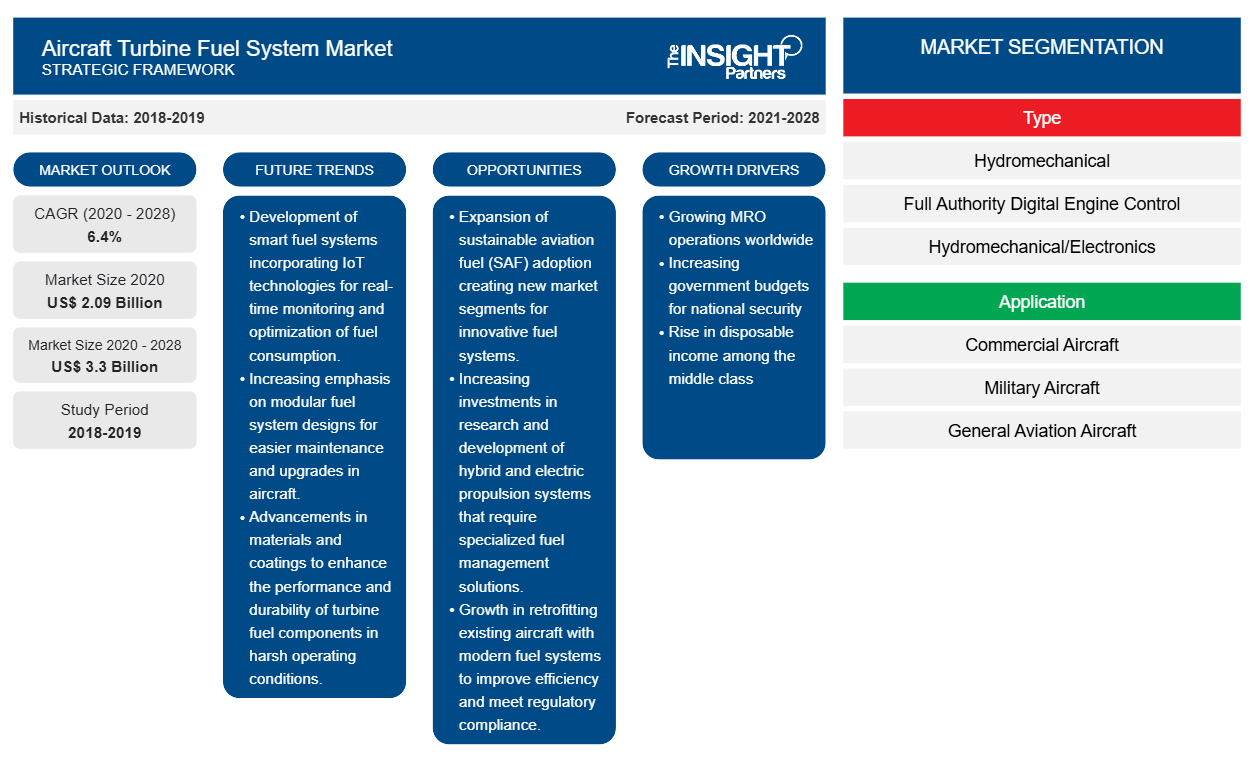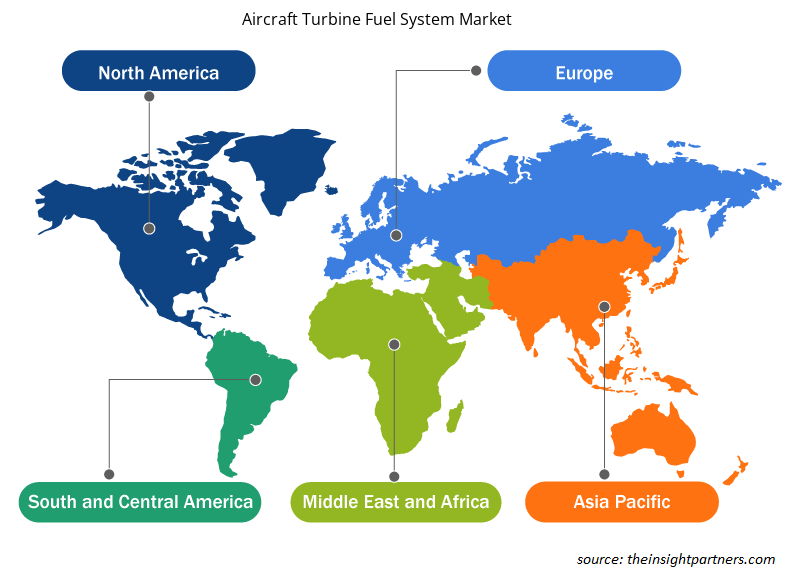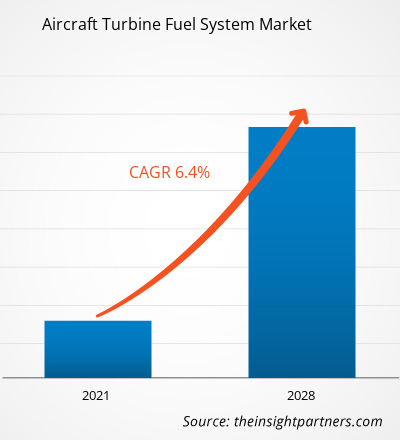[Research Report] The aircraft turbine fuel system market was valued at US$ 2,087.63 million in 2020 and is projected to reach US$ 3,303.73 million by 2028; it is expected to grow at a CAGR of 6.4% from 2021 to 2028.
The aircraft turbine fuel system is one of the crucial systems in aircraft. The aircraft turbine fuel system manages the flow of fuel for optimum performance of the aircraft during various stages of flight, such as rapid maneuvering, changes in altitude, and sudden acceleration or deceleration. Initially, the aircraft turbine fuel system was operated manually by the flight operators; however, with the advancement in technology, self-calibrating aircraft turbine fuel systems, such as Full Authority Digital Engine Control (FADEC), were introduced in the market. The aircraft turbine fuel system market is experiencing significant growth owing to the increasing year-on-year government budgets for national security. Governments across the world are significantly investing in the procurement of advanced state-of-the-art commercial as well as military aircraft fleet. Additionally, growing commercial aviation industry owing to rise in disposable income among middle class population coupled with the growing MRO operation across the world is bolstering the aircraft production rate, which is propelling the demand for aircraft turbine fuel system market globally.
Customize This Report To Suit Your Requirement
You will get customization on any report - free of charge - including parts of this report, or country-level analysis, Excel Data pack, as well as avail great offers and discounts for start-ups & universities
Aircraft Turbine Fuel System Market: Strategic Insights

- Get Top Key Market Trends of this report.This FREE sample will include data analysis, ranging from market trends to estimates and forecasts.
You will get customization on any report - free of charge - including parts of this report, or country-level analysis, Excel Data pack, as well as avail great offers and discounts for start-ups & universities
Aircraft Turbine Fuel System Market: Strategic Insights

- Get Top Key Market Trends of this report.This FREE sample will include data analysis, ranging from market trends to estimates and forecasts.
Impact of COVID-19 Pandemic on Aircraft Turbine Fuel System Market
Amid COVID-19 outbreak pandemic, the entire commercial aviation industry came to a halt with minimal resources to foresee the future. Several production units in the US, France, Russia, and China were temporarily paused to adhere to the government rules regarding the lockdown and physical distancing. The aircraft manufacturers witnessed 30%–50% reduction in demand for most of the aircraft models, especially, commercial aircraft models. The lower aircraft production and assembly declined the demand for aircraft turbine fuel system, resulting in lower revenue generation. This factor restrained the growth of the aircraft turbine fuel system market.
Aircraft Turbine Fuel System Market Insights
Surging Aircraft Manufacturing
Owing to substantial production of military and commercial aircraft fleet, the global aviation industry is growing at a steady rate. Over the last decade, the commercial aviation industry has witnessed tremendous growth owing to growing disposable income among masses coupled with emergence of low-cost carriers (LCCs) and various fleet expansion initiatives undertaken by the full-service carriers (FSCs). The commercial aviation industry is predicted to upsurge in the near future owing to rising number of air travel passengers and aircraft procurement. Thus, the growing procurement of aircraft across the world is anticipated to propel the aircraft turbine fuel system market during the forecast period.
Type-Based Market Insights
Based on the type, the aircraft turbine fuel system market is segmented into hydromechanical, full authority digital engine control (FADEC), and hydromechanical/electronics. The Full Authority Digital Engine Control (FADEC) uses a digital computer, known as an EEC (Electronic Engine Control) or ECU (engine control unit), and related accessories to control the parameters of aircraft engine performance. The FADEC functions by receiving multiple input variables, such as engine temperatures, engine pressures, throttle lever position, and air density of real-time flight conditions. The input is gathered by ECU or EEC and is processed up to 70 times per second. Better fuel efficiency, efficient engine operation, automatic engine protection with regards to out-of-tolerance operations, better system integration with engine and aircraft systems, and engine monitoring and diagnostics are the major factors driving the growth of aircraft turbine fuel system market.
The players operating in the aircraft turbine fuel system market focus on strategies such as mergers, acquisitions, and market initiatives to maintain their positions in the market. A few developments by key players are listed below:
- In 2021, Honeywell International Inc. announced the development of a turbogenerator for hybrid-electric aircraft. The new turbogenerator will run on jet fuel, diesel, and sustainable fuel alternatives.
- In 2021, Triumph Group, Inc. announced that it has secured multiple contract extensions with Boeing Commercial Airplanes, which would extend their collaboration on critical system components. The contracts highlight Triumph's strategic focus on high-value systems offerings including actuation, hydraulic and fuel systems, geared solutions, as well as maintenance, repair, and overhaul offerings.
Aircraft Turbine Fuel System Market Regional Insights
The regional trends and factors influencing the Aircraft Turbine Fuel System Market throughout the forecast period have been thoroughly explained by the analysts at Insight Partners. This section also discusses Aircraft Turbine Fuel System Market segments and geography across North America, Europe, Asia Pacific, Middle East and Africa, and South and Central America.

- Get the Regional Specific Data for Aircraft Turbine Fuel System Market
Aircraft Turbine Fuel System Market Report Scope
| Report Attribute | Details |
|---|---|
| Market size in 2020 | US$ 2.09 Billion |
| Market Size by 2028 | US$ 3.3 Billion |
| Global CAGR (2020 - 2028) | 6.4% |
| Historical Data | 2018-2019 |
| Forecast period | 2021-2028 |
| Segments Covered |
By Type
|
| Regions and Countries Covered | North America
|
| Market leaders and key company profiles |
Aircraft Turbine Fuel System Market Players Density: Understanding Its Impact on Business Dynamics
The Aircraft Turbine Fuel System Market is growing rapidly, driven by increasing end-user demand due to factors such as evolving consumer preferences, technological advancements, and greater awareness of the product's benefits. As demand rises, businesses are expanding their offerings, innovating to meet consumer needs, and capitalizing on emerging trends, which further fuels market growth.
Market players density refers to the distribution of firms or companies operating within a particular market or industry. It indicates how many competitors (market players) are present in a given market space relative to its size or total market value.
Major Companies operating in the Aircraft Turbine Fuel System Market are:
- Eaton
- Honeywell International Inc.
- Jihostroj
- Mascott Equipment Co.
- Parker Hannifin Corp.
Disclaimer: The companies listed above are not ranked in any particular order.

- Get the Aircraft Turbine Fuel System Market top key players overview
The report segments the global aircraft turbine fuel system market as follows:
By Type
- Hydromechanical
- Full Authority Digital Engine Control (FADEC)
- Hydromechanical/Electronics
By Application
- Commercial Aircraft
- Military Aircraft
- General Aviation Aircraft
By Geography
- North America
- US
- Canada
- Mexico
- Europe
- France
- Germany
- Italy
- UK
- Russia
- Rest of Europe
- Asia Pacific (APAC)
- China
- India
- South Korea
- Japan
- Australia
- Rest of APAC
- Middle East & Africa (MEA)
- South Africa
- Saudi Arabia
- UAE
- Rest of MEA
- South America (SAM)
- Brazil
- Rest of SAM
Company Profiles
- Collins Aerospace
- Eaton Corporation plc
- Honeywell International Inc.
- Jihostroj a.s.
- Mascott Equipment Co.
- Parker-Hannifin Corporation
- Safran
- Silver Atena GmbH
- Triumph Group, Inc.
- Woodward, Inc.
Frequently Asked Questions
Which type is expected to dominate the market in the forecast period?
The aircraft turbine fuel system market is led by full authority digital engine control (FADEC) segment with highest share and is expected to dominate in the forecast period. The Full Authority Digital Engine Control (FADEC) uses a digital computer, known as an EEC (Electronic Engine Control) or ECU (engine control unit), and related accessories to control the parameters of aircraft engine performance. The FADEC functions by receiving multiple input variables, such as engine temperatures, engine pressures, throttle lever position, and air density of real-time flight conditions. The input is gathered by ECU or EEC and is processed up to 70 times per second. Better fuel efficiency, efficient engine operation, automatic engine protection with regards to out-of-tolerance operations, better system integration with engine and aircraft systems, and engine monitoring and diagnostics are the major factors driving the growth of aircraft turbine fuel system market.
What are reasons behind aircraft turbine fuel system market growth?
Governments across the world are significantly investing on procurement of advanced state-of-the-art commercial as well as military aircraft fleet. Additionally, growing commercial aviation industry owing to rise in disposable income among middle class population coupled with the growing MRO operation across the world is bolstering the growth of the aircraft production rate. This is reflecting rise in demand for aircraft turbine fuel system market
What are market opportunities for aircraft turbine fuel system market?
Since the beginning of the 21st century, the aviation industry has flourished in China. At present, China holds the second-largest aviation market after the US. Boeing, American aircraft giant, in November 2020 announced that Chinese carriers are projected to acquire 8,600 new airplanes over the next 20 years. Also, the country’s commercial jet fleet has expanded sevenfold since 2000, which is ~25% of all aviation growth worldwide over the past decade. According to Carnoc, about 25% of the global single-aisle aircraft were procured by Chinese carriers. The incremental growth of the aviation industry in China is attributed to rapid growth in middle-class consumers coupled with robust economic growth and growing urbanization. Further, the Aircraft giants such as Boeing and Airbus have manufacturing assemblies in China, which complements the growth of the aircraft turbine fuel system market. Also, in setback of Boeing 737, two consecutive crash and the announcement of discontinuation of Airbus A320 is projected to complement the adoption of COMAC C919 and C929 aircraft as these are considered the immediate substitute to Boeing 737 and Airbus A320. Meanwhile, the country has the second-largest defense budget across the world after the US, and a significant portion of the defense is allotted to the procurement of advanced military aircraft and upgradation & MRO operations. Thus, all these are bolstering the aviation industry in China, which is projected to create ample growth opportunities for aircraft turbine fuel system market players.
- Historical Analysis (2 Years), Base Year, Forecast (7 Years) with CAGR
- PEST and SWOT Analysis
- Market Size Value / Volume - Global, Regional, Country
- Industry and Competitive Landscape
- Excel Dataset
- Aircraft MRO Market
- Helicopter Hoists Winches and Hooks Market
- Fixed-Base Operator Market
- Aerospace Fasteners Market
- Aerospace Stainless Steel And Superalloy Fasteners Market
- Aircraft Floor Panel Market
- Military Optronics Surveillance and Sighting Systems Market
- Smoke Grenade Market
- Airport Runway FOD Detection Systems Market
- Artillery Systems Market
Testimonials
I wish to appreciate your support and the professionalism you displayed in the course of attending to my request for information regarding to infectious disease IVD market in Nigeria. I appreciate your patience, your guidance, and the fact that you were willing to offer a discount, which eventually made it possible for us to close a deal. I look forward to engaging The Insight Partners in the future, all thanks to the impression you have created in me as a result of this first encounter.
DR CHIJIOKE ONYIA, MANAGING DIRECTOR, PineCrest Healthcare Ltd.The Insight Partners delivered insightful, well-structured market research with strong domain expertise. Their team was professional and responsive throughout. The user-friendly website made accessing industry reports seamless. We highly recommend them for reliable, high-quality research services
Yukihiko Adachi CEO, Deep Blue, LLC.Reason to Buy
- Informed Decision-Making
- Understanding Market Dynamics
- Competitive Analysis
- Customer Insights
- Market Forecasts
- Risk Mitigation
- Strategic Planning
- Investment Justification
- Identifying Emerging Markets
- Enhancing Marketing Strategies
- Boosting Operational Efficiency
- Tracking Industry Innovations
- Aligning with Regulatory Trends
Yes! We provide a free sample of the report, which includes Report Scope (Table of Contents), report structure, and selected insights to help you assess the value of the full report. Please click on the "Download Sample" button or contact us to receive your copy.
Absolutely — analyst assistance is part of the package. You can connect with our analyst post-purchase to clarify report insights, methodology or discuss how the findings apply to your business needs.
Once your order is successfully placed, you will receive a confirmation email along with your invoice.
• For published reports: You’ll receive access to the report within 4–6 working hours via a secured email sent to your email.
• For upcoming reports: Your order will be recorded as a pre-booking. Our team will share the estimated release date and keep you informed of any updates. As soon as the report is published, it will be delivered to your registered email.
We offer customization options to align the report with your specific objectives. Whether you need deeper insights into a particular region, industry segment, competitor analysis, or data cut, our research team can tailor the report accordingly. Please share your requirements with us, and we’ll be happy to provide a customized proposal or scope.
The report is available in either PDF format or as an Excel dataset, depending on the license you choose.
The PDF version provides the full analysis and visuals in a ready-to-read format. The Excel dataset includes all underlying data tables for easy manipulation and further analysis.
Please review the license options at checkout or contact us to confirm which formats are included with your purchase.
Our payment process is fully secure and PCI-DSS compliant.
We use trusted and encrypted payment gateways to ensure that all transactions are protected with industry-standard SSL encryption. Your payment details are never stored on our servers and are handled securely by certified third-party processors.
You can make your purchase with confidence, knowing your personal and financial information is safe with us.
Yes, we do offer special pricing for bulk purchases.
If you're interested in purchasing multiple reports, we’re happy to provide a customized bundle offer or volume-based discount tailored to your needs. Please contact our sales team with the list of reports you’re considering, and we’ll share a personalized quote.
Yes, absolutely.
Our team is available to help you make an informed decision. Whether you have questions about the report’s scope, methodology, customization options, or which license suits you best, we’re here to assist. Please reach out to us at sales@theinsightpartners.com, and one of our representatives will get in touch promptly.
Yes, a billing invoice will be automatically generated and sent to your registered email upon successful completion of your purchase.
If you need the invoice in a specific format or require additional details (such as company name, GST, or VAT information), feel free to contact us, and we’ll be happy to assist.
Yes, certainly.
If you encounter any difficulties accessing or receiving your report, our support team is ready to assist you. Simply reach out to us via email or live chat with your order information, and we’ll ensure the issue is resolved quickly so you can access your report without interruption.















The List of Companies - Aircraft Turbine Fuel System Market
- Eaton
- Honeywell International Inc.
- Jihostroj
- Mascott Equipment Co.
- Parker Hannifin Corp.
- Safran
- Triumph Group, Inc.
- Turbine Fuel Systems Inc.
- Woodward Inc.
- Collins Aerospace






 Get Free Sample For
Get Free Sample For